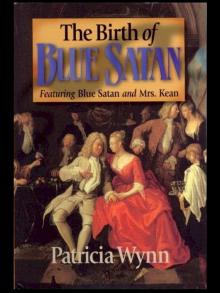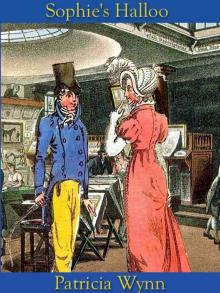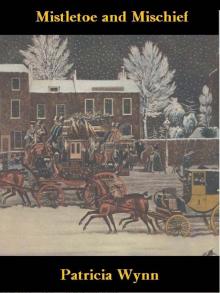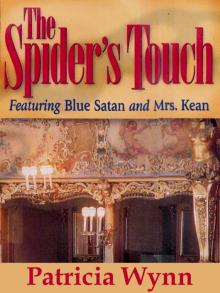- Home
- Patricia Wynn
The Spider's Touch Page 2
The Spider's Touch Read online
Page 2
Today was the Duke of Ormonde’s birthday, but never had there been a celebration like this. His Grace should have been honoured this morning by private visits to his house, but no birthday but a royal one should ever be celebrated publicly in the streets.
Some men from the militia tried to break up the crowd, but they were quickly surrounded and beaten, too. Whoever had the courage to support King George was running to take cover.
“Where are my footmen?” Harrowby shouted again. His voice cracked on the final word. “Here, you! Coachman! Give them a taste of your whip!”
“Yer not goin’ anywhere, till ye drinks to the health of King James. Let me hear ye! Ormonde! No King George! Give us King James III!”
Lord Lovett gave a desperate shove, freed one hand, and reached for his sword.
As the man dived again and nearly dragged him into the street, Sir Humphrey shrieked, “Ormonde! No King George! King James III!”
The rioter had nearly managed to pull Lord Lovett from the coach. Hester and Isabella grabbed his coattails and struggled to hang on.
“High Church and Ormonde!” Sir Humphrey bleated again.
At last the man heard him through his drunken fog. He released Lord Lovett so suddenly that he fell backwards, landing on top of Hester, who had been pulling harder than the rest.
“That’s more like!” The man gave them a great big grin. “Now let me hear ye all say it— No, wait! I’ll get ye a tankard so ye can toast his Grace and our rightful king.”
He turned to stagger away, and in that moment, Lord Lovett recovered his footing. He quickly banged on the roof of the coach, slammed its door, and shouted, “Coachman, whip up the horses!”
As their driver complied, the coach gave a huge lurch forward. “High Church and Ormonde!” Lord Lovett called back out the window. Sir Humphrey had never ceased his cheering, and now he stuck his round face out the opposite window and cheered even louder. Hester joined them, waving with friendliness to the mob as their coach was allowed through.
One horrible sight after another met their eyes. One man who was brave enough—or foolish enough—to huzzah King George was dragged from his carriage box and soundly beaten. A nonconformist church was set afire.
They had no notion of what had become of their footmen and dared not stop to see if they’d been hurt. No one in the coach spoke or exchanged a glance until they had left the rioters far behind.
By the time they cleared St. Paul’s, Sir Humphrey’s breaths were coming in deep gasps and his eyes were wide. He started to say something, but Lord Lovett cut him off.
“It would seem—” he stared at his friend— “that you were right and I was wrong. I owe you an apology, Cove, and I must thank you for your quick thinking, which has saved me from a beating, if nothing worse.”
Sir Humphrey looked as if he might make a reply, but he was too overcome with emotion. His eyes filled with tears, and he nodded, remaining silent until they dropped him before his lodgings in Jermyn Street.
“Quick thinking, that,” Harrowby agreed, once Sir Humphrey was gone. He was still holding onto Isabella, whether for his comfort or hers Hester could not say. “I only hope his Majesty never gets wind of this.”
“I doubt he will.” Lord Lovett’s amusement seemed to indicate that he had fully recovered from the frightening ordeal. Indeed, he seemed admirably relaxed. “I doubt that anyone in that mob will be eager to report his participation in it, or even what was said. Our attempts at self-preservation are likely to go unremarked.”
“The confound impudence of it!” Harrowby began to fume again. “How dare they hold up Ormonde so high? I have never heard them cheer his Grace of Marlborough in that scandalous way. Damned Jacobites! Ormonde had better be careful if he don’t want trouble for himself. They shall see what comes of all this treasonous talk. Mark my words, but they will!”
Lord Lovett eased his body against the cushions. In shifting his position, he met Hester’s gaze, where he must have spied a sign of his own reflections, for he gave her a secretive smile. “I am certain you will soon have them quaking in their boots, my lord.”
Hester tried not to laugh, but after all the shock and the excitement, she found it nearly impossible.
* * * *
Thomas Barnes, groom, valet and general man of business, had started to fret at the absense of his lord. If truth be told, he’d been anxious from the moment his master, the Viscount St. Mars, had decided to take himself off to France. They had quarreled mightily about St. Mars’s going alone, Tom refusing to be parted from him, and his master insisting that Tom stay behind.
“I will not have you getting caught sneaking out of the country with me,” St. Mars had said. “They would be sure to hang you. Is that what you want?” Then, with a ghost of his former humour, he added, “And, besides, I thought you did not care for the French.”
Ignoring an obvious attempt to distract him, Tom retorted, “And I thought you said you wouldn’t be in any danger, my lord.”
St. Mars sighed. “Travelling alone, I do not expect to be, but I can hardly escape unnoticed with an army at my heels.”
“I ain’t no army, my lord.”
“A retinue, then. Have we not established that you are my gang of one? I’m counting on you to keep up the pretense with Lade. I want him to think that I have a gang of cutthroats at my beck and call.”
Lade, their landlord at the Fox and Goose, deep in the Weald of Kent, was a Newgate gaolbird, who harboured highwaymen and dealt in smuggled goods, and had to be kept in his place. Neither St. Mars nor Tom had been able to discover whether he knew the identity of the mysterious Mr. Brown and his servant who had appeared over a month ago to take up residence at his inn. Clearly, he suspected St. Mars of something, but not, perhaps, of being the viscount charged with murdering his own father. At least, he had not “squeaked beef,” as he would have said, to get the reward of three hundred pounds that had been placed on St. Mars’s head. Instead, he eagerly pocketed the money St. Mars doled out to rent the Fox and Goose and its servants for his private use. And St. Mars had given Lade to understand that if he ever called down the law on his wealthy guest, then he would feel free to mention his host’s connections with smugglers and highwaymen.
“I need you here, Tom,” St. Mars continued. “I need you to keep an eye on my belongings, and to take care of Penny—” his beloved horse— “and to let me know at once of any reason that I should come back.”
“You do mean to come back, don’t you, sir? Before too long?”
Tom had not liked the way St. Mars had hesitated over his reply. The despair that sometimes showed through his careful demeanour had betrayed itself for a moment. “I shall return when I cannot bear to stay away any longer, or when I am needed. For the last, I count on you to let me know. You should open any letter that comes for me. Is that understood?”
“Yes, my lord, but—” Tom had found it difficult to shape the question he had wanted to ask, so he had ended with, “You won’t leave me here too long?”
“If you find it too long, you must write to tell me. Address your letters to my steward, Monsieur Lavalle, at St. Mars. He will see that I get them.”
And Tom had had to be content.
* * * *
Now nearly a month had gone by, and nary a word from his master had come. Tom had thrown himself into improving St. Mars’s quarters in this flea-ridden inn they’d been forced to call home. With a few discreet repairs—nothing too grand, which might have called the attention of the authorities to the house—some furniture ordered from tradesmen in Maidstone, and the hiring of a cook and laundress, he had made the place ready for St. Mars’s return. These lodgings were not so bad for a man like Tom who had slept most of his life over the stables, but they were a degradation compared to Rotherham Abbey and Hawkhurst House, two of the six important properties St. Mars should have inherited upon his father’s death.
If there was one thing Tom had learned in his short time as groom to an outlaw,
however, it was the need for secrecy. It was secrecy that kept him close to the inn with virtually nothing to do all day. He exercised Penny and Beau—the horse he had taken for himself from Lord Hawkhurst’s stables—along the footpaths and drovers’ trails throughout the Weald, memorizing their turns and twists, in case he and his master had to flee the King’s Messengers, and learning to think—if he only knew it—something like the highwayman’s accomplice he had become. But no two horses could occupy an experienced groom all of any day, and he found himself with far too much time to think about things that he would rather ignore.
As he was doing this evening, as he brushed Penny down after a long, sweating ride. He caught himself ruminating about the woman who kept house for Lade. A pretty woman, turned harlot after going to gaol for being gulled by a thief. A warm, cheerful sort of female, skilled with a needle, who had spent hours happily working over the silks and satins they had bought for St. Mars.
Katy still had to serve Lade’s customers in the taproom, where Tom took his meals now that St. Mars was gone. Tom had rejected her friendly advances. He didn’t truck with whores. But he had noticed that, even though she still put on a smile for the men who came into the taproom, she never looked for their attention. If anything, since asking for the job of caring for St. Mars’s clothes, and getting it, she had become adept at fending them off. She managed them with a cheerful goodwill—to avoid angering Lade, Tom suspected.
These observations had been a torment. Tom did not want to admire her. Staying away from her would be so much easier if he could only find fault. He wanted nothing at all to do with a whore, former or otherwise. His father had died of the pox, and Tom knew that there was no greater torture on earth—maybe not even in hell.
If only St. Mars had not left him here alone!
He was putting away his brushes, about to face the daily ordeal of watching her serve his dinner, when he heard the rare sound of hoof beats in the yard and a man’s voice calling out for service.
Avis, the stableboy, dropped his pitchfork and ran running to take charge of the man’s horse. Tom stayed out of sight. He tried to get a glimpse of the rider, but the man disappeared into the inn with hardly a word to the boy.
The Fox and Goose was a small, ramshackle inn in a hamlet, which had nothing to recommend it but a few hedgerow alehouses. Deep in the Weald, it did not lie on any important road. Nor did it receive the custom of men on horseback, unless they, like St. Mars, had something to hide.
As soon as Avis returned, leading the visitor’s horse, Tom accosted him. “Who’s the stranger?”
Avis answered cheerfully, “Oh, Mr. Menzies ain’t no stranger. He stops every now and then. And he tips me a George, if I’m quick enough.”
“What kind of rogue is he?”
“You mean, is he one of the banditti?” Avis asked, then shrugged, unconcerned. “I don’t think so. But if he is, he’d be one of the gentl’men for sure.”
Tom did not like the thought of any stranger staying at the Fox and Goose. The locals and drovers who came to drink posed enough of a threat to St. Mars, but a gentleman who traveled through on other business might inform the authorities in London about the mysterious Mr. Brown who resided in a place that no respectable person should ever call home.
Walking into the taproom, Tom caught a look at the man, who was dressed in a gentleman’s riding wig, tall leather boots, and fashionable traveling clothes. An arrogant face and bearing, combined with an intolerant manner, did nothing to make him more appealing. Lade, however, had greeted him like a welcome guest, and Katy obviously knew him, too. No curiosity showed in her eyes, but she bustled to serve him with a sort of deference that no other customer received.
Tom seated himself at a table by the fire, near the cage where the dog was turning the spit. As the animal worked its wheel, Tom was only able to observe the stranger a few moments more before Lade conducted him into the private parlour. The parlour that was leased to St. Mars, who had paid for its use.
Katy made trips inside to carry them food and some of Lade’s smuggled French wine. Each time she emerged, her brown eyes grew a little more clouded. And on more than one of these occasions, she threw Tom a glance that contained a mix of hurt and resentment. Tom couldn’t imagine what right she had to be angry with him, but after several minutes of this treatment, he decided it was time he discovered what was going on.
He rose from his bench and sauntered across the tight, mean corridor to Lade’s private parlour. Emboldened beyond his usual state, he did not knock before opening the door.
“What the—!”
He was more than a little disconcerted when the gentleman, seated with Lade, leapt to his feet, scraping his bench against the floor, and pulled out his sword. Tom retreated a step, while Lade, who was a little slow to react, stood up between them and said, “That’s bene, sir! That’s Tom, what works for the gentry-cove I was tellin’ ye about.”
Tom was not pleased to hear that Lade had been wagging his tongue about St. Mars. Taking matters into his own hands, he said, “Why’s this gentleman using Mr. Brown’s parlour, Lade. It’s been let for the time.”
Menzies sneered, “I am not accustomed to having my comfort challenged—least of all by a servant.”
“There’s no need to make ‘im brush.” Lade’s tone was wheedling, which meant he knew he was in the wrong. “Mr. Menzies ‘ere’s one of us. He’s a rum ‘un, ‘e is.”
“And you mean to charge him for a room you’ve been paid for. I know how your mind works, Lade.”
Lade scowled. “Now there’s where yer wrong, ye chub! I haven’t asked ‘im fer a grig. Have I, Mr. Menzies? I would never try to nip one of his Majesty’s men, would I?”
The stranger ignored him. Sitting down on his bench again, he leaned back, the better to examine Tom. He raked him from head to toe, with so much insolence on his face that Tom could hear an angry pulse starting in his ears.
“I should like to meet this master of yours,” Menzies said, finally. “Lade has told me some curious things about him.”
“Has he?” Tom feigned an indifference he could not feel. Every hair on his back had risen in warning. He would have something to say to Lade as soon as this gentleman was gone. “My master would be happy to meet you, too, if only to find out why you and Lade here are so chatty about another gentleman’s business.”
Menzies responded with an angry gleam. “Oh, you mustn’t blame Lade. He has been in my service these past two years. This parlour, which your master has taken, according to you, has always been placed at my disposal. I find myself wondering why a man, such as Lade has described your master to be, would bother to stop in such an out-of-the-way place?”
Tom had learned a thing or two these past few months. And he countered immediately, “I was wonderin’ the same about you, Mr. Menzies. What business do you have in these parts?”
Lade gave a guffaw. “Why, the same sort of business we all have, chub! Do y’think I don’t know yer Mr. Brown is gone to France? Now what sort of business would he get up to there?”
Menzies regarded Tom closely, as if searching for a sign that he understood. “Indeed, I am very sorry to miss him. I’ll look forward to seeing him on my way back through, but for now—” he turned to Lade— “I would be glad to retire to my room. Is it the same as usual, or has Mr. Brown taken it, too?”
Turning scarlet, Lade rubbed a hand across the back of his neck and squirmed. “Now ye knows I don’t like to disoblige ye, but that room is sort of took. I can turn Katy out of hers for ye, though.”
Menzies grimaced. “I shall want the sheets aired, but you can tell the wench to join me when I’m settled.”
A knot quickly formed in the pit of Tom’s stomach. Katy had been made to entertain Lade’s guests in the past. But that was all supposed to be over—wasn’t it? She had not been used that way since St. Mars and he had come to the Fox and Goose. St. Mars had hired her to tend his clothes, for there was no man in Pigden with the skills to do
it. It had never occurred to Tom that Katy would be asked to whore again.
He found himself saying, belligerently, “Katy works for my master now. She’s not Lade’s servant any more.”
Lade threw him a glare, but Tom drew himself up, daring either man to contradict him.
Fortunately, Menzies looked only mildly annoyed as he turned to say to Lade, “If this is the sort of welcome I am to receive in this house, you will be very fortunate if I ever stop here again. But—” he glanced at Tom, with a less than friendly look— “perhaps your Mr. Brown will no longer be here when I return. Either that, or he will find a way to satisfy me for the inconvenience he has caused.”
He picked up his tricorn and riding cloak and, with a sneer for Tom, strode past him and up the narrow stairs.
“Now why did ye go and do that?” Lade asked, as soon as he was gone. “As if yer master had ever lain wif my wench. He don’t even fancy ‘er to my way o’ thinkin’.”
Tom hedged, unable to explain. “The less that gentl’man stops here the better.”
“Well, ye’d better get used to ‘im. He rides back and forth from Lunnon to the coast. I sees ‘im two or three times a year a least. And whenever he’s been, ye always hears of somethin’ goin’ on. There must be somethin’ brewin’ up in Lunnon for sure or he wouldn’t be comin’ through now.”
Tom, who was shaking strangely in the wake of his confrontation over Katy, didn’t bother to attend. He took himself upstairs to his own room, where he tidied his things.
* * * *
Later that night, when he heard Katy’s light footfall on the floor of the gallery, he went out to meet her. Her look of surprise made his innards feel topsy-turvy.
“You’re to sleep in my room tonight,” he said roughly. “That fellow Menzies has taken yours. The master won’t mind if I use his room this once.” He would bed down on the floor, but she didn’t need to know that.

 The Bumblebroth
The Bumblebroth The Birth of Blue Satan
The Birth of Blue Satan Jack on the Box
Jack on the Box Sophie's Halloo
Sophie's Halloo Mistletoe and Mischief
Mistletoe and Mischief The Christmas Spirit
The Christmas Spirit The Spider's Touch
The Spider's Touch A Country Affair
A Country Affair A Pair of Rogues
A Pair of Rogues